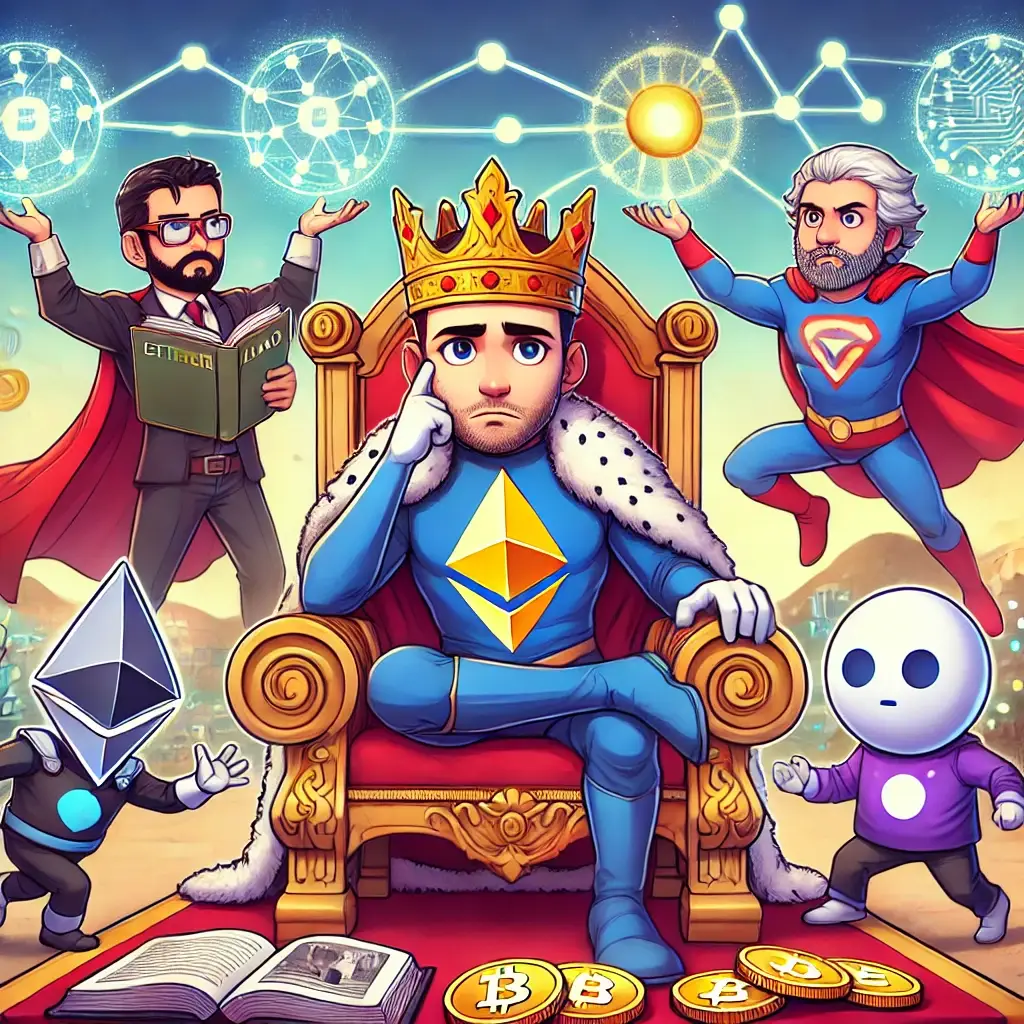Introduction: Ethereum and Its Challenges 🏆
Ethereum is not just a cryptocurrency; it's an entire ecosystem that sets the standard for smart contracts and decentralized applications (dApps). This blockchain has made DeFi, NFTs, DAOs, and much more possible. However, with great power comes great responsibility—and high fees, network congestion, and scalability issues.
This is where Ethereum’s competitors step in, ready to take advantage of its weaknesses:
- Solana (SOL) – A fast, low-cost network focused on DeFi and NFTs ⚡
- Cardano (ADA) – A carefully developed academic project with long-term vision 🎓
- Polkadot (DOT) – A blockchain ecosystem connecting different networks 🔗
In this article, we’ll explore how these projects are challenging Ethereum’s dominance, their advantages, and whether they can dethrone the king of smart contracts.
1. Ethereum: Why Is It Still the Leader? 🏅
🔹 Why Is Ethereum So Popular?
- ✅ The first major smart contract platform – Ethereum pioneered decentralized applications.
- ✅ A massive ecosystem – Thousands of projects run on Ethereum (DeFi, NFTs, GameFi, DAOs).
- ✅ High liquidity – ETH is accepted on all major exchanges.
- ✅ Ethereum 2.0 (Proof-of-Stake) – Transitioning to PoS makes the network more energy-efficient.
🔻 Ethereum’s Biggest Weaknesses
- ❌ High gas fees – Sending $50 can cost you $20 in transaction fees! 🤯
- ❌ Low throughput – 15 transactions per second (TPS) is simply not enough.
- ❌ Network congestion – Transactions can take hours during peak times.
- ❌ Competition from new blockchains – Ethereum is losing some users to faster, cheaper alternatives.
2. Solana: The Ethereum Killer or Just Hype? 🚀
🔹 Why Is Solana Better Than Ethereum?
- ✅ Near-instant transactions – Confirmations in just 400 milliseconds!
- ✅ Ultra-low fees – Less than $0.0001 per transaction.
- ✅ A thriving DeFi and NFT ecosystem – Solana is popular in GameFi.
- ✅ Strong VC backing – Top investors are funding its growth.
🔻 Solana’s Issues
- ❌ Centralization concerns – A few validators control most of the network.
- ❌ Frequent outages – Solana has suffered over 10 major outages since 2022!
- ❌ Heavy reliance on venture capital – Without VC support, Solana’s growth might slow down.
3. Cardano: The Academic Alternative to Ethereum 🎓
🔹 Why Is Cardano Better Than Ethereum?
- ✅ Proof-of-Stake from day one – More energy-efficient and scalable.
- ✅ High decentralization – Thousands of validators ensure security.
- ✅ Future scalability (Hydra) – Theoretically capable of handling 1 million TPS.
- ✅ Strong focus on security – All updates undergo extensive audits.
🔻 Cardano’s Weaknesses
- ❌ Slow development – Every upgrade takes years of research.
- ❌ Limited dApp ecosystem – Fewer applications compared to Ethereum and Solana.
- ❌ Limited interoperability – Fewer cross-chain integrations.
4. Polkadot: The Blockchain Connector 🌉
🔹 Why Is Polkadot Better Than Ethereum?
- ✅ Interoperability – Allows different blockchains to communicate.
- ✅ Parachains – Custom blockchains can be built on the network.
- ✅ High security – The relay chain provides shared security.
- ✅ Flexibility – Developers can customize their own blockchain logic.
🔻 Polkadot’s Challenges
- ❌ Complexity – The structure can be difficult for beginners to understand.
- ❌ Lower liquidity – Trading volumes are smaller compared to Ethereum.
- ❌ Limited parachain slots – Demand for parachains exceeds availability.
5. Ethereum vs. Competitors: Who Will Win? 🏁
Comparison Table 📊
| Feature | Ethereum | Solana | Cardano | Polkadot |
|---|---|---|---|---|
| Speed | 15 TPS | 65,000 TPS | ~250 TPS | 1,000+ TPS |
| Fees | High | Low | Low | Medium |
| Decentralization | High | Low | High | High |
| Reliability | High | Frequent outages | Very high | High |
| Ecosystem | Massive | Rapidly growing | Developing | Still forming |
6. Conclusion: What’s Next for Ethereum and Its Competitors? 🔮
Ethereum remains the dominant smart contract platform, but its competitors are growing fast.
- 🔹 Solana – Lightning-fast but unstable.
- 🔹 Cardano – Slow but reliable.
- 🔹 Polkadot – The blockchain connector.
There’s no clear winner yet. Ethereum’s Layer 2 solutions (Arbitrum, Optimism) and Ethereum 2.0 upgrades will help it maintain dominance, but competition will only intensify.
Which blockchain do you prefer? Let us know in the comments! ⬇️💬
